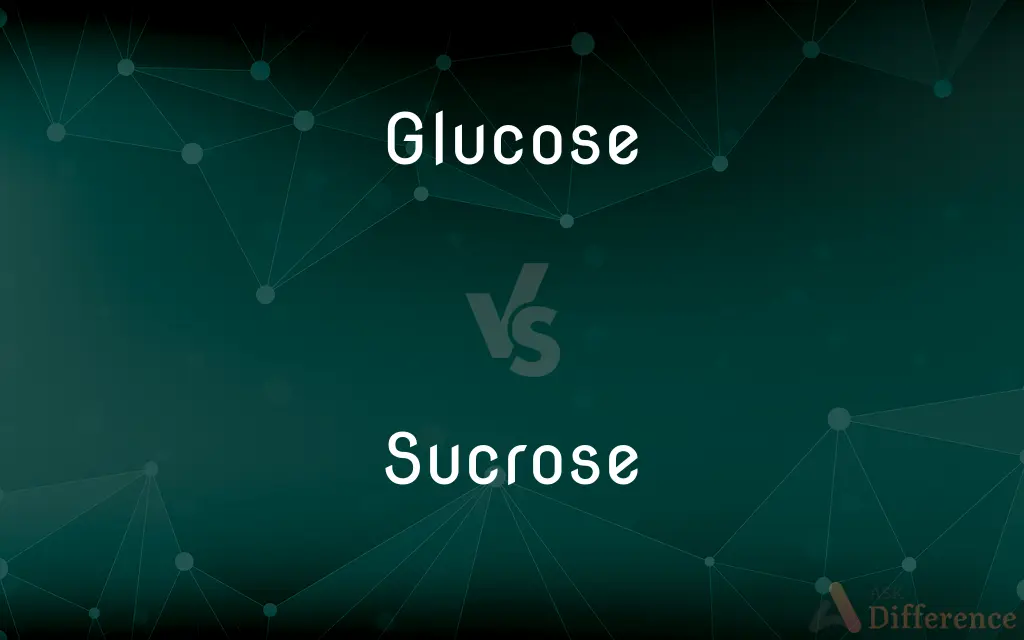Glucose vs. Sucrose — What's the Difference?
Edited by Tayyaba Rehman — By Urooj Arif — Updated on April 21, 2024
Glucose is a simple sugar with a single molecule structure, essential for cellular energy, while sucrose, table sugar, is a disaccharide composed of glucose and fructose.

Difference Between Glucose and Sucrose
Table of Contents
ADVERTISEMENT
Key Differences
Glucose is a monosaccharide, often referred to as a simple sugar, and is crucial in biological energy production. Whereas sucrose is a disaccharide that includes both glucose and fructose, and is commonly known as table sugar.
In terms of chemical structure, glucose consists of a single six-membered ring, while sucrose contains two of these rings linked together. Sucrose is typically sweeter than glucose due to the presence of fructose, which has a higher sweetness index.
Glucose serves as a key energy source for cells and is involved in many metabolic pathways, whereas sucrose is more often used for flavor and energy storage in plants.
Comparison Chart
Type of Sugar
Monosaccharide
Disaccharide
Components
Single sugar molecule
Glucose + Fructose
ADVERTISEMENT
Sweetness
Less sweet
Sweeter
Digestion
Absorbed directly
Must be broken down first
Role in Metabolism
Primary energy source
Energy storage and flavor
Compare with Definitions
Glucose
A critical component of photosynthesis and energy production in plants.
Glucose produced by plants during photosynthesis is crucial for their growth.
Sucrose
A disaccharide consisting of one glucose molecule and one fructose molecule.
The enzymatic breakdown of sucrose yields one molecule each of glucose and fructose.
Glucose
Can exist in various forms such as dextrose or blood sugar.
Dextrose is medically used as a synonym for glucose in intravenous solutions.
Sucrose
Plays a key role in plant energy storage and transport.
Sucrose is transported from the leaves of plants to other parts where it is needed.
Glucose
A simple sugar that is an important energy source in living organisms and is a component of many carbohydrates.
Glucose levels in the blood can indicate how well the body is metabolizing sugars.
Sucrose
Common table sugar derived from sugar cane or sugar beets, used widely as a sweetener.
Sucrose is often added to coffee to enhance its flavor.
Glucose
Often used in medical treatments and food as an energy supplement.
Emergency glucose gels are used to treat hypoglycemic episodes.
Sucrose
Subject to a specific enzymatic process called hydrolysis, which splits it into its constituent sugars.
The digestion of sucrose begins in the mouth with the action of the enzyme amylase.
Glucose
Glucose is a simple sugar with the molecular formula C6H12O6. Glucose is the most abundant monosaccharide, a subcategory of carbohydrates.
Sucrose
Used in various industrial processes besides its culinary uses.
Sucrose is used in the fermentation process in industries to produce ethanol.
Glucose
A simple sugar which is an important energy source in living organisms and is a component of many carbohydrates.
Sucrose
Sucrose is made up of one molecule of glucose and one molecule of fructose joined together. It is a disaccharide, a molecule composed of two monosaccharides: glucose and fructose.
Glucose
A colorless to yellowish syrupy mixture of dextrose, maltose, and dextrins containing about 20 percent water, used in confectionery, alcoholic fermentation, tanning, and treating tobacco. Also called starch syrup.
Sucrose
A crystalline disaccharide of fructose and glucose, C12H22O11, extracted chiefly from sugarcane and sugar beets and commonly known as table sugar. Also called saccharose.
Glucose
(carbohydrate) A simple monosaccharide (sugar) with a molecular formula of C6H12O6; it is a principle source of energy for cellular metabolism.
Sucrose
(carbohydrate) A disaccharide with formula C12H22O11, consisting of two simple sugars, glucose and fructose; normal culinary sugar.
Glucose
A variety of sugar occurring in nature very abundantly, as in ripe grapes, and in honey, and produced in great quantities from starch, etc., by the action of heat and acids. It is only about half as sweet as cane sugar. Called also dextrose, grape sugar, diabetic sugar, and starch sugar. See Dextrose.
Sucrose
A common variety of sugar found in the juices of many plants, as the sugar cane, sorghum, sugar maple, beet root, etc. It is extracted as a sweet, white crystalline substance which is valuable as a food product, and, being antiputrescent, is largely used in the preservation of fruit. Called also saccharose, cane sugar, etc. At one time the term was used by extension, for any one of the class of isomeric substances (as lactose, maltose, etc.) of which sucrose proper is the type; however this usage is now archaic.
Glucose
Any one of a large class of sugars, isometric with glucose proper, and including levulose, galactose, etc.
Sucrose
A complex carbohydrate found in many plants and used as a sweetening agent
Glucose
The trade name of a sirup, obtained as an uncrystallizable reside in the manufacture of glucose proper, and containing, in addition to some dextrose or glucose, also maltose, dextrin, etc. It is used as a cheap adulterant of sirups, beers, etc.
Glucose
A monosaccharide sugar that has several forms; an important source of physiological energy
Common Curiosities
What role does glucose play in metabolism?
Glucose is a primary energy source for cells and is crucial in metabolic pathways.
What is glucose?
Glucose is a simple monosaccharide sugar, fundamental to cellular energy.
What is sucrose?
Sucrose, commonly known as table sugar, is a disaccharide made up of glucose and fructose.
What are the sources of glucose in our diet?
Fruits, vegetables, and honey are common sources of glucose.
Which is sweeter, glucose or sucrose?
Sucrose is generally considered sweeter than glucose.
How does the body process glucose differently from sucrose?
The body uses glucose directly, whereas it must hydrolyze sucrose to access the glucose and fructose.
How are glucose and sucrose used differently in plants?
Glucose is mainly a product of photosynthesis, while sucrose acts as a transport and storage molecule.
Can glucose and sucrose be used interchangeably in cooking?
While both can sweeten foods, sucrose is typically preferred for its sweeter taste and texture properties.
What are the industrial uses of glucose versus sucrose?
Glucose is often used in fermentation and pharmaceuticals, while sucrose is used in fermentation and as a preservative.
How does the sweetness of glucose compare to that of fructose?
Fructose, which is part of sucrose, is significantly sweeter than glucose.
Where do we commonly find sucrose?
Sucrose is most commonly found in table sugar and sweetened products.
What are some health considerations for consuming glucose and sucrose?
Excessive intake of either can lead to health issues like obesity and diabetes; moderation is advised.
Is sucrose natural or synthetic?
Sucrose is a natural sugar found in plants, particularly sugarcane and sugar beets.
Share Your Discovery

Previous Comparison
Chronolect vs. Lect
Next Comparison
Channel vs. PassageAuthor Spotlight
Written by
Urooj ArifUrooj is a skilled content writer at Ask Difference, known for her exceptional ability to simplify complex topics into engaging and informative content. With a passion for research and a flair for clear, concise writing, she consistently delivers articles that resonate with our diverse audience.
Edited by
Tayyaba RehmanTayyaba Rehman is a distinguished writer, currently serving as a primary contributor to askdifference.com. As a researcher in semantics and etymology, Tayyaba's passion for the complexity of languages and their distinctions has found a perfect home on the platform. Tayyaba delves into the intricacies of language, distinguishing between commonly confused words and phrases, thereby providing clarity for readers worldwide.














































